Module 2 Experiences Unit 2 They have seen the Pyramids 同步练习(含答案)
文档属性
| 名称 | Module 2 Experiences Unit 2 They have seen the Pyramids 同步练习(含答案) | 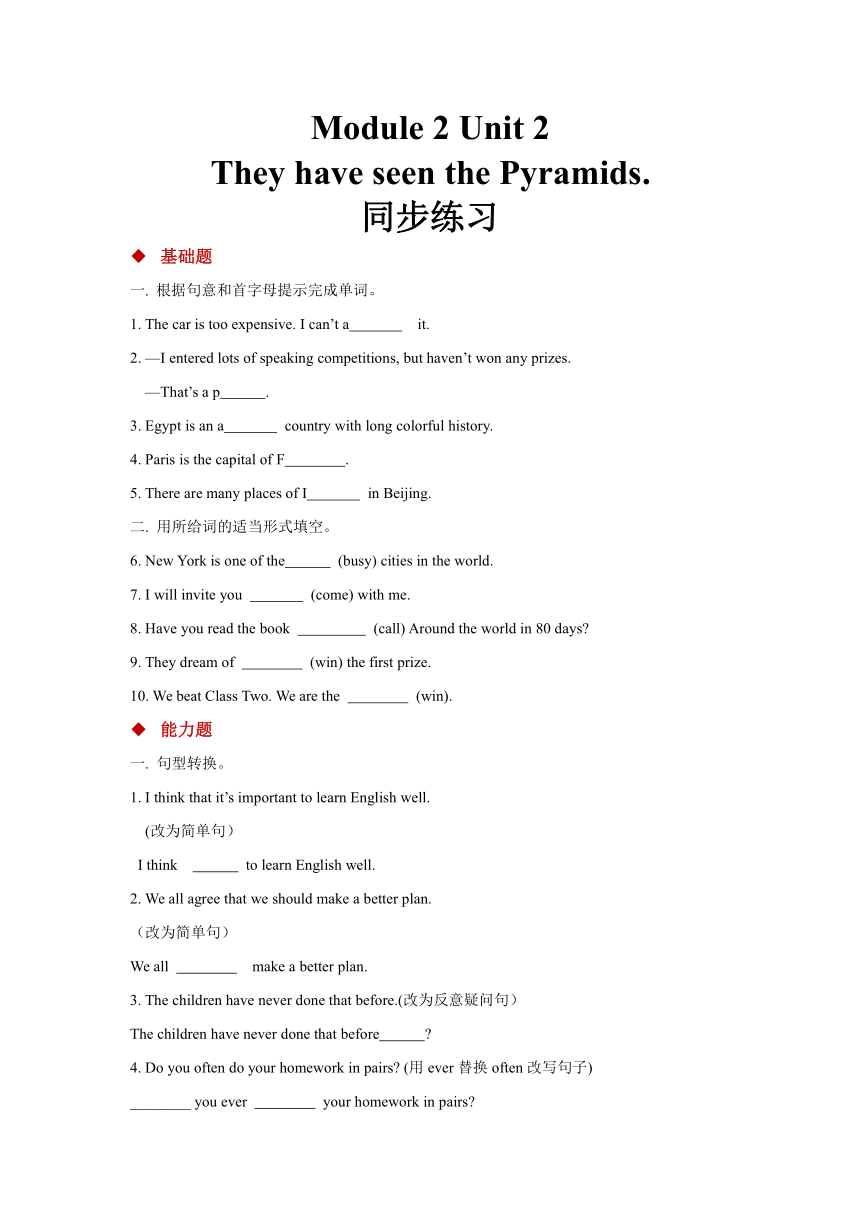 | |
| 格式 | zip | ||
| 文件大小 | 26.9KB | ||
| 资源类型 | 教案 | ||
| 版本资源 | 外研版 | ||
| 科目 | 英语 | ||
| 更新时间 | 2019-07-15 15:26:48 | ||
图片预览

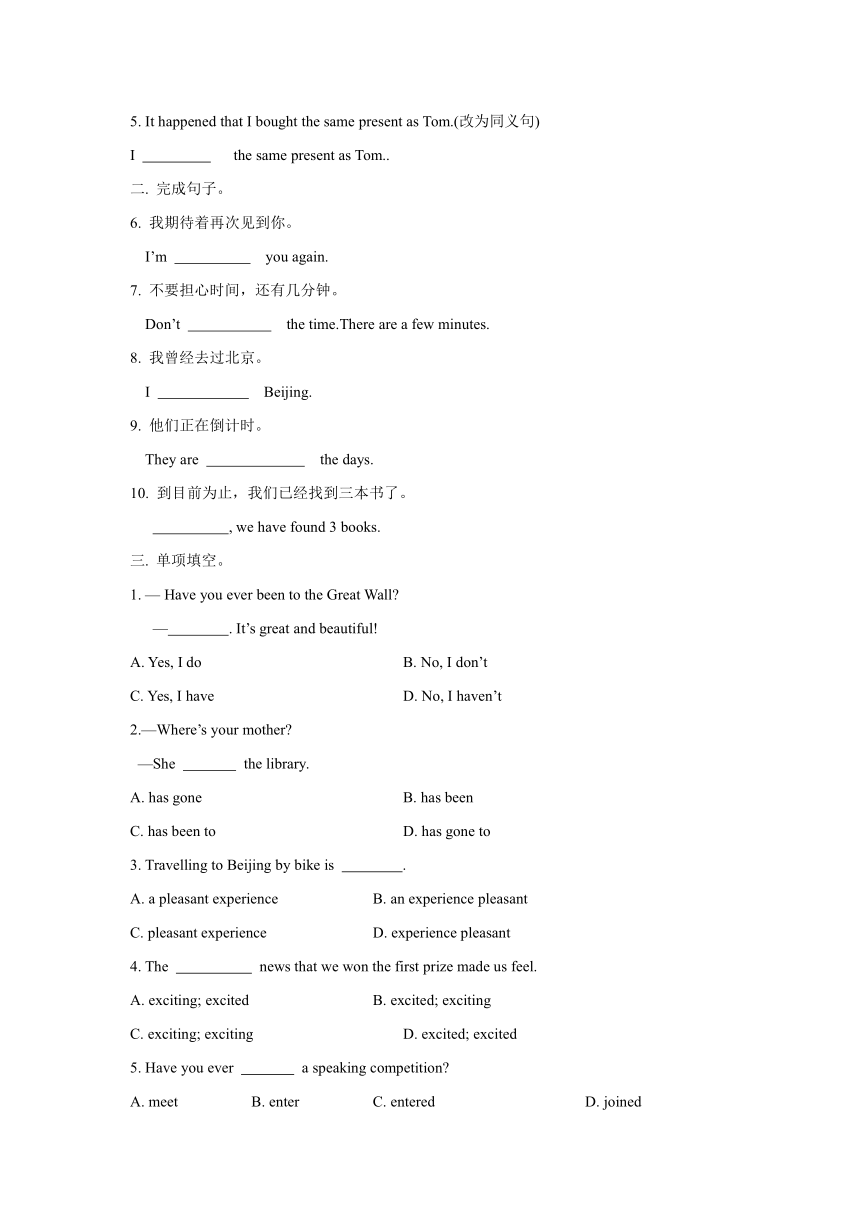
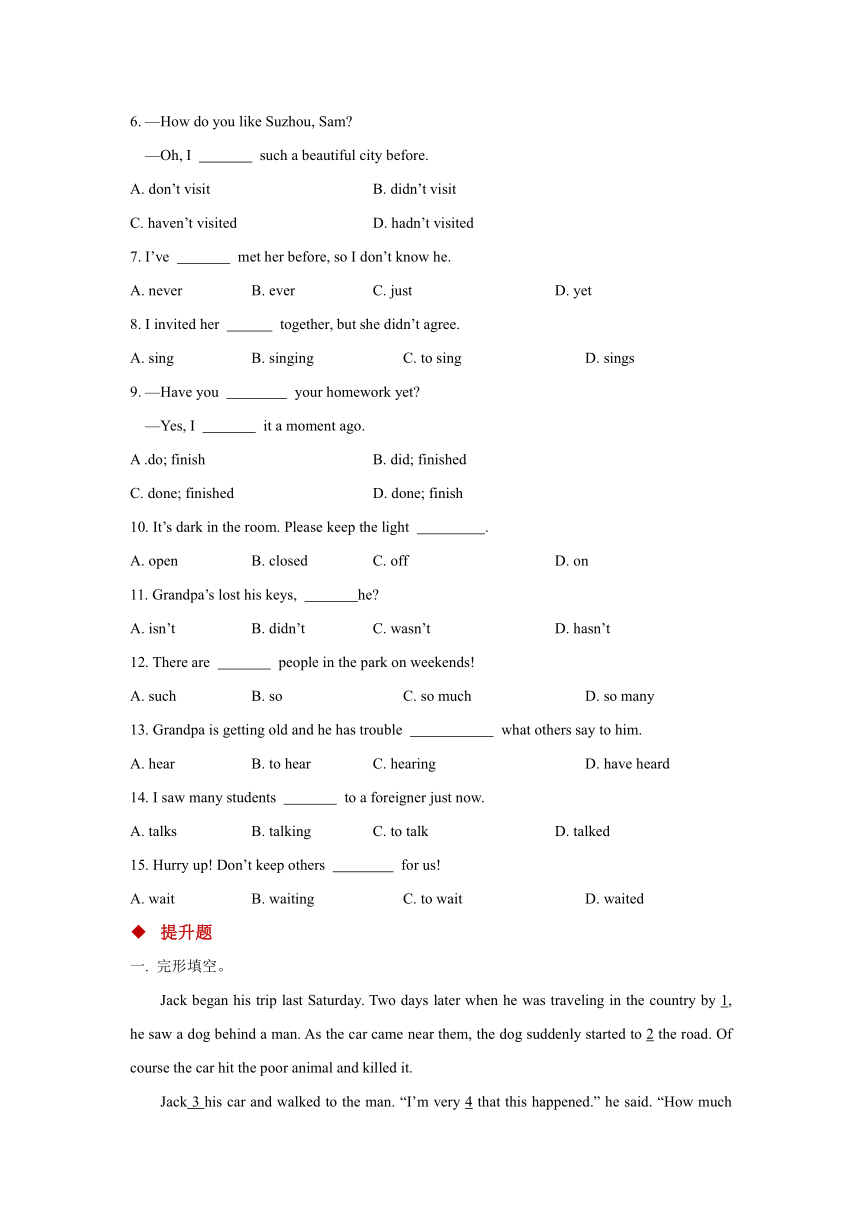
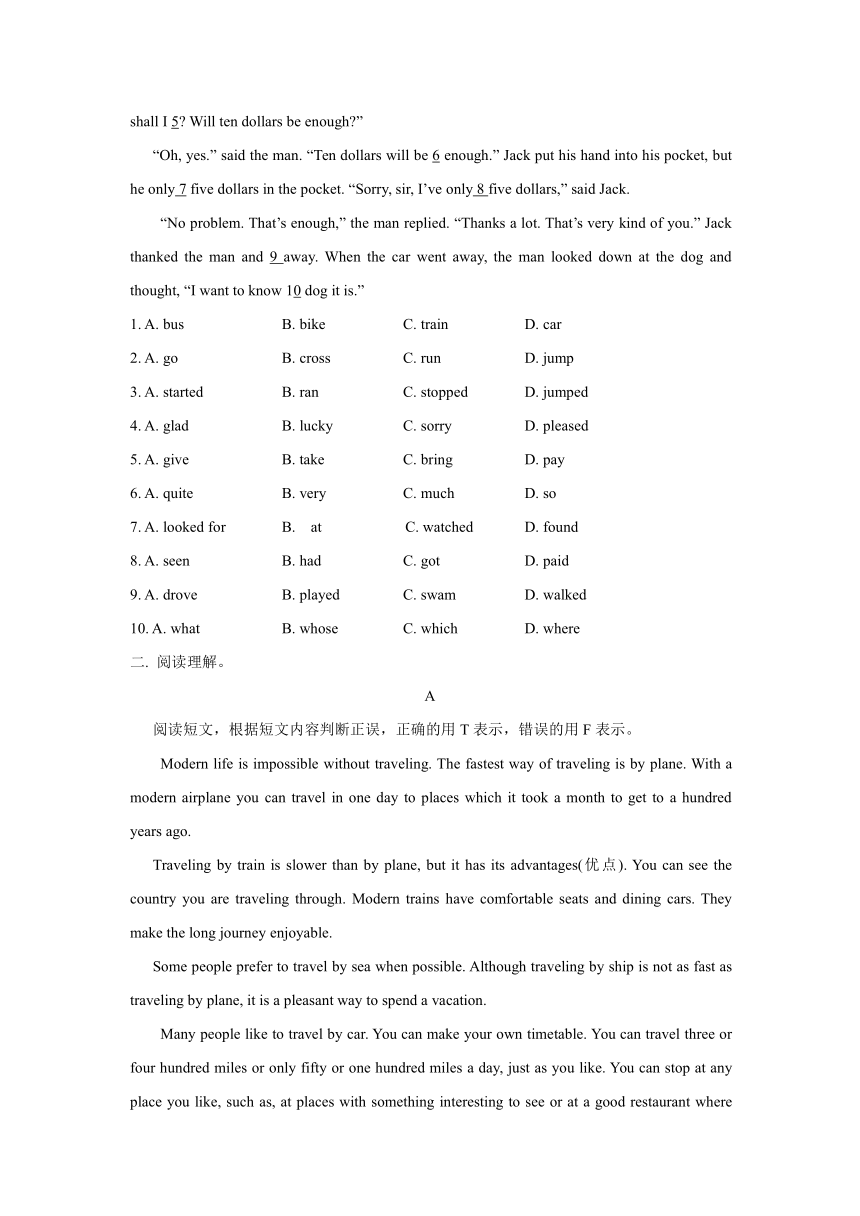
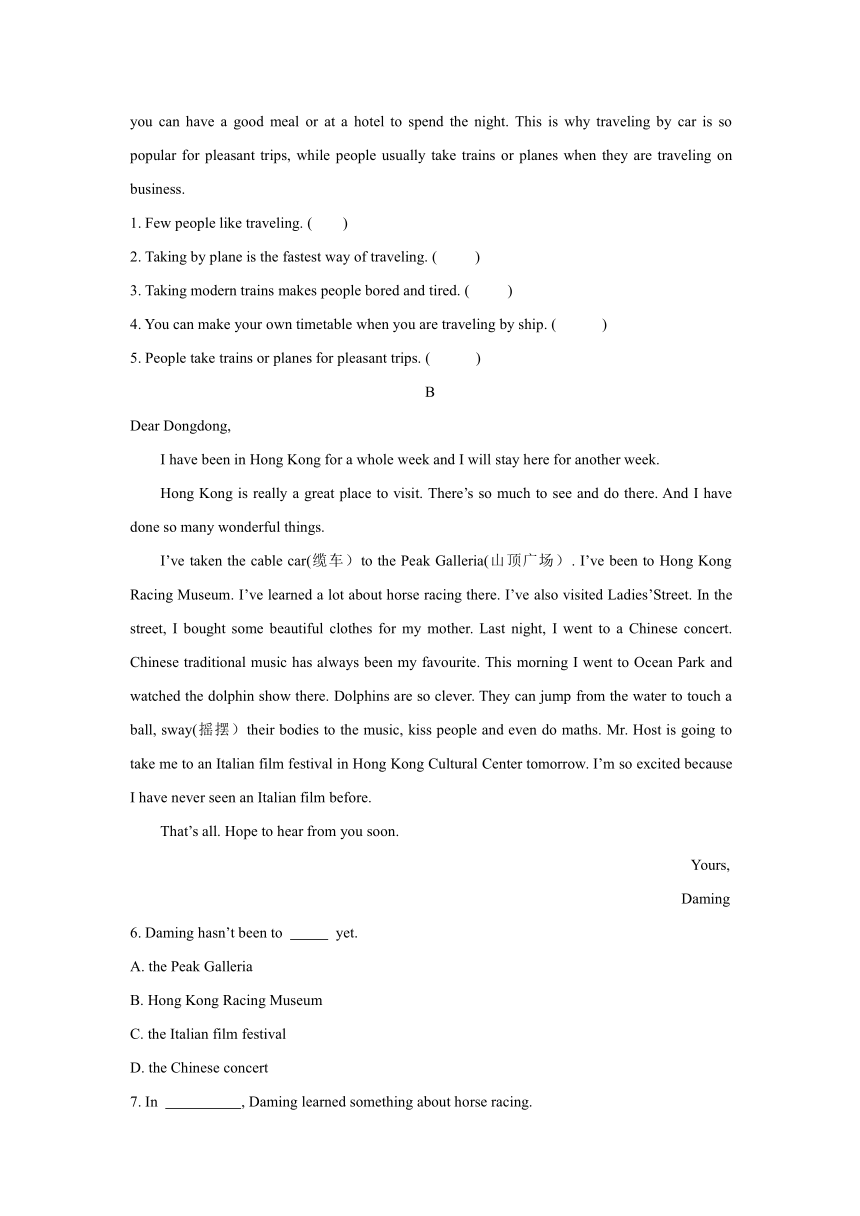
文档简介
Module 2 Unit 2
They have seen the Pyramids.
同步练习
基础题
根据句意和首字母提示完成单词。
1. The car is too expensive. I can’t a it.
2. —I entered lots of speaking competitions, but haven’t won any prizes.
—That’s a p .
3. Egypt is an a country with long colorful history.
4. Paris is the capital of F .
5. There are many places of I in Beijing.
二. 用所给词的适当形式填空。
6. New York is one of the (busy) cities in the world.
7. I will invite you (come) with me.
8. Have you read the book (call) Around the world in 80 days?
9. They dream of (win) the first prize.
10. We beat Class Two. We are the (win).
能力题
一. 句型转换。
1. I think that it’s important to learn English well.
(改为简单句)
I think to learn English well.
2. We all agree that we should make a better plan.
(改为简单句)
We all make a better plan.
3. The children have never done that before.(改为反意疑问句)
The children have never done that before ?
4. Do you often do your homework in pairs? (用ever替换often改写句子)
________ you ever your homework in pairs?
5. It happened that I bought the same present as Tom.(改为同义句)
I the same present as Tom..
完成句子。
6. 我期待着再次见到你。
I’m you again.
7. 不要担心时间,还有几分钟。
Don’t the time.There are a few minutes.
8. 我曾经去过北京。
I Beijing.
9. 他们正在倒计时。
They are the days.
10. 到目前为止,我们已经找到三本书了。
, we have found 3 books.
单项填空。
1. — Have you ever been to the Great Wall?
— . It’s great and beautiful!
A. Yes, I do B. No, I don’t
C. Yes, I have D. No, I haven’t
2.—Where’s your mother?
—She the library.
A. has gone B. has been
C. has been to D. has gone to
3. Travelling to Beijing by bike is .
A. a pleasant experience B. an experience pleasant
C. pleasant experience D. experience pleasant
4. The news that we won the first prize made us feel.
A. exciting; excited B. excited; exciting
C. exciting; exciting D. excited; excited
5. Have you ever a speaking competition?
A. meet B. enter C. entered D. joined
6. —How do you like Suzhou, Sam?
—Oh, I such a beautiful city before.
A. don’t visit B. didn’t visit
C. haven’t visited D. hadn’t visited
7. I’ve met her before, so I don’t know he.
A. never B. ever C. just D. yet
8. I invited her together, but she didn’t agree.
A. sing B. singing C. to sing D. sings
9. —Have you your homework yet?
—Yes, I it a moment ago.
A .do; finish B. did; finished
C. done; finished D. done; finish
10. It’s dark in the room. Please keep the light .
A. open B. closed C. off D. on
11. Grandpa’s lost his keys, he?
A. isn’t B. didn’t C. wasn’t D. hasn’t
12. There are people in the park on weekends!
A. such B. so C. so much D. so many
13. Grandpa is getting old and he has trouble what others say to him.
A. hear B. to hear C. hearing D. have heard
14. I saw many students to a foreigner just now.
A. talks B. talking C. to talk D. talked
15. Hurry up! Don’t keep others for us!
A. wait B. waiting C. to wait D. waited
提升题
完形填空。
Jack began his trip last Saturday. Two days later when he was traveling in the country by 1, he saw a dog behind a man. As the car came near them, the dog suddenly started to 2 the road. Of course the car hit the poor animal and killed it.
Jack 3 his car and walked to the man. “I’m very 4 that this happened.” he said. “How much shall I 5? Will ten dollars be enough?”
“Oh, yes.” said the man. “Ten dollars will be 6 enough.” Jack put his hand into his pocket, but he only 7 five dollars in the pocket. “Sorry, sir, I’ve only 8 five dollars,” said Jack.
“No problem. That’s enough,” the man replied. “Thanks a lot. That’s very kind of you.” Jack thanked the man and 9 away. When the car went away, the man looked down at the dog and thought, “I want to know 10 dog it is.”
1. A. bus B. bike C. train D. car
2. A. go B. cross C. run D. jump
3. A. started B. ran C. stopped D. jumped
4. A. glad B. lucky C. sorry D. pleased
5. A. give B. take C. bring D. pay
6. A. quite B. very C. much D. so
7. A. looked for B. at C. watched D. found
8. A. seen B. had C. got D. paid
9. A. drove B. played C. swam D. walked
10. A. what B. whose C. which D. where
二. 阅读理解。
A
阅读短文,根据短文内容判断正误,正确的用T表示,错误的用F表示。
Modern life is impossible without traveling. The fastest way of traveling is by plane. With a modern airplane you can travel in one day to places which it took a month to get to a hundred years ago.
Traveling by train is slower than by plane, but it has its advantages(优点). You can see the country you are traveling through. Modern trains have comfortable seats and dining cars. They make the long journey enjoyable.
Some people prefer to travel by sea when possible. Although traveling by ship is not as fast as traveling by plane, it is a pleasant way to spend a vacation.
Many people like to travel by car. You can make your own timetable. You can travel three or four hundred miles or only fifty or one hundred miles a day, just as you like. You can stop at any place you like, such as, at places with something interesting to see or at a good restaurant where you can have a good meal or at a hotel to spend the night. This is why traveling by car is so popular for pleasant trips, while people usually take trains or planes when they are traveling on business.
1. Few people like traveling. ( )
2. Taking by plane is the fastest way of traveling. ( )
3. Taking modern trains makes people bored and tired. ( )
4. You can make your own timetable when you are traveling by ship. ( )
5. People take trains or planes for pleasant trips. ( )
B
Dear Dongdong,
I have been in Hong Kong for a whole week and I will stay here for another week.
Hong Kong is really a great place to visit. There’s so much to see and do there. And I have done so many wonderful things.
I’ve taken the cable car(缆车)to the Peak Galleria(山顶广场). I’ve been to Hong Kong Racing Museum. I’ve learned a lot about horse racing there. I’ve also visited Ladies’Street. In the street, I bought some beautiful clothes for my mother. Last night, I went to a Chinese concert. Chinese traditional music has always been my favourite. This morning I went to Ocean Park and watched the dolphin show there. Dolphins are so clever. They can jump from the water to touch a ball, sway(摇摆)their bodies to the music, kiss people and even do maths. Mr. Host is going to take me to an Italian film festival in Hong Kong Cultural Center tomorrow. I’m so excited because I have never seen an Italian film before.
That’s all. Hope to hear from you soon.
Yours,
Daming
6. Daming hasn’t been to yet.
A. the Peak Galleria
B. Hong Kong Racing Museum
C. the Italian film festival
D. the Chinese concert
7. In , Daming learned something about horse racing.
A. Ocean Park
B. Hong Kong Racing Museum
C. Hong Kong Cultural Center
D. Ladies’ Street
8. Last night Daming went to .
A. Ladies’ Street B. a Chinese concert
C. the Italian film festival D. the Peak Galleria
9. Dolphins can’t .
A. ride bicycles B. kiss people
C. do maths D. dance
10. According to the passage, which of the following is NOT true?
A. Daming has planned to stay in Hong Kong for two weeks.
B. This morning Daming went to watch the dolphin show.
C. Daming likes Chinese traditional music very much.
D. Daming has seen an Italian film before.
三. 书面表达。
假如你是Kate,给你的朋友Mike写一封信,讲一讲你在北京的经历。请根据提示写一封60~70词左右的信。信的开头已给出,但不计入总词数。
Things to do in China
Go to Beijing√
See Beijing Opera√
Eat roast duck√
Climb the Great Wall×
Visit the Palace Museum√
Take photos of Beijing √ Dear Mike,
I’m having a wonderful time in China. I went to Beijing last month.
I have
There’s only one thing I haven't done yet. I haven’t
Yours,
Kate
答案和解析
基础题
【答案】
afford; pity; ancient; France; interest
busiest; to come; called; winning; winners
【解析】
1. afford 由前句句意“这辆车太贵了”可知后句句意为“我负担不起”。故填afford。
2. pity 由上句句意“我参加了许多演讲比赛,但是没有赢得任何奖品”可知下句句意为“太可惜了”。
3. ancient 句意为“埃及是一个古老的有很长和丰富历史的国家”。ancient “古老的”。
4. France 句意为“巴黎是法国的首都”。France “法国”。
5. interest places of interest“名胜古迹”,为固定短语。
二. 6. busiest “one of the+形容词的最高级+可数名词复数”意为“最……之一”,是固定结构,故填busiest。
7. to come invite sb.to do sth.“邀请某人做某事”,是固定短语,故填to come。
8. called 句意为“你读过这本叫做《80天环游世界》的书吗?”此处动词call与其修饰的名词存在被动关系,应使用其过去分词形式作后置定语,故填called。
9. winning dream of doing sth.“梦想做某事”,为固定搭配,故填winning。
10. winners 句意为“我们击败了二班。我们是获胜者”。winner“获胜者”。
能力题
【答案】
1. it important 2. agree to 3. have they 4. Have; done 5. happened to buy
6. looking forward to seeing 7. worry about 8. have been to 9. counting down 10. So far
1-5 C D A A C 6-10 C A C C D 11-15 D D C B B
【解析】
本题要求学生补全句子,要求学生能够根据句子正确写出单词,每空一词。
本题要求学生用所给词的适当形式填空,要求学生能够正确将单词与句子进行匹配。
1. C 问句为现在完成时,故其简略回答为:Yes,I have./No,I haven’t.,可排除A、B两项。由答语后句句意“它很壮观而且美丽”可知应去过此地,故答案选C。
2. D 问句句意为“你妈妈在哪里”,可知所询问对象已离开并且尚未回来,应使用have/has gone to结构,故答案选D。
3. A 句意为“骑自行车去北京旅行是一次令人愉快的经历”。experience此处用作可数名词,意为“经历”,故答案选A。
4. A exciting“令人激动的”,其修饰对象通常是物;excited“激动的”,其修饰对象多指人。句意为“获得了一等奖的这个令人激动的消息使我们感到兴奋”。故答案选A。
5. C meet“遇到”;enter“进入”;join“参加”。句意为“你曾经参加过演讲比赛吗”,且句中的助动词为have,应使用动词的过去分词构成现在完成时,故答案选C。
6. C before常单独用于现在完成时的句末作时间状语,故答案选C。
7. A never“从不;决不 ”;ever“曾经”;just“刚刚”;yet“还”由后半句句意“因此我不认识她”可知前半句句意为“我以前从来没有见过她”,故答案选A。
8. C invite sb.to do sth.“邀请某人做某事”,为固定结构,故答案选C。
9. C 问句中的助动词为have,其动词应使用过去分词形式构成现在完成时;答语句末a moment ago“刚才”为过去时间状语,谓语动词使用一般过去时,故答案选C。
10. D open/closed可用作形容词,意为“开着的/关着的”,多用于指门窗等“开关”的状态,on/off可用作副词,意为“已连接、处于工作状态或使用/未连接,不工作”,多用于指电器“开关”的状态,句意为“房间里很暗,开着灯吧”。故答案选D。
11. D 由题干可知,陈述句为现在完成时,“'s”此处表示has,故答案选D。
12. D such “这样的”,修饰名词(短语);so“这样的”,用于修饰形容词或副词,so much“那么多的”,可用于修饰不可数名词;so many “那么多的”,修饰复数名词,句意为“在周末公园里有那么多的人”。故答案选D。
13. C have trouble (in) doing sth.“做某事有困难”,固定搭配,故答案选C。
14. B 由句意“我刚刚看到许多学生和一名外国人在交谈”可知应强调talk动作正在进行,应使用see sb.doing sth.“看到某人(在)做某事”,故答案选B。
15. B keep sb.doing sth.“让某人一直做某事”,固定搭配,故答案选B。
提升题
【答案】
1-5 D B C C D 6-10 C D B A B
1-5 F T F F F 6-10 C B B A D
参考范文:
Dear Mike,
I’m having a wonderful time in China. I went to Beijing last month.
I have seen Beijing Opera. I found it different from pop music,but it is interesting and fun. Eating roast duck was a good experience. I had never seen roast duck before. I have also visited the Palace Museum. I have taken many photos of Beijing. I’ll show them to you.
There’s only one thing I haven’t done yet.
I haven’t climbed the Great Wall. That’s a pity. I wish I could climb it one day.
Yours,
Kate
【解析】
一. 1. D 由第一段末句“Of course the car hit the poor animal and killed it.”可知答案应为D。
2. B go“去”;cross“穿过”;run“跑”;jump“跳”。句意为“一只狗突然开始过马路”。故答案选B。
3. C start“发动”;run“跑”;stop“停止”;jump“跳”。句意为“杰克停下车走向这个人”。故答案选C。
4. C glad“高兴的”;lucky“幸运的”,sorry“遗憾的;抱歉的”;pleased“满意的”。联系上下文可知此处句意应为“我很遗憾发生了这样的事”。故答案选C。
5. D give“给”;take“拿;花费(时间)”;bring“带来”;pay“付代价”,句意为“我应该赔多少钱?”,故答案选D。
6. C quite副词,“相当”;very可用作副词“很”或形容词“恰好的”;much可用作形容词“很多”或副词“非常”;so可用作副词“这么”。由句意为“十美元够多了”可知此处应使用形容词much,故答案选C。
7. D look for “寻找”;look at “看”;watch “看;观察”;find “找到;发现”。句意为“杰克把手伸进口袋里,但是只找到了五美元”。故答案选D。
8. B see “看到”;have “有”;get “获得”;pay “付费”,句意为“对不起,先生,我只有五美元”。故答案选B。
9. A drive “开车”;play “玩”,swim “游泳”;walk “步行”。联系上下文可知,句意为“杰克谢过这个人之后开车离开了”。故答案选A。
10. B what“什么”;whose“谁的”;which“哪一个”;where“在哪里”。句意为“我想知道是谁的狗”。故答案选B。
二. 1. F 由短文首句句意“现代生活离了旅行是不可能的”可知此处表述不正确,故填F。
2. T 由短文第一段第二句“The fastest way of traveling is by plane.”可知此处表述正确,故填T。
3. F 由短文第二段末句“Modern trains have comfortable seats and dining?cars.They make the long journey enjoyable.”可知此处表述错误,故填F。
4. F 由短文第四段首句“Many people like to travel by car.You can make your own time table.”可知此处表述不正确,故填F。
5. F 由短文未段中“This is why traveling by car is so popular...on business.”可知此处表述错误,故填F。
6. C 由第三段第一、二句“I've taken the cable car (缆车)to the Peak Galleria (山顶广场).I’ve been to Hong Kong Racing Museum.”和第六句“Last night,I went to a Chinese concert.”以及倒数第二句可知答案应选C。
7. B 由短文第三段中“I've been to Hong Kong Racing Museum.I've learned a lot about horse racing there.”可知答案应为B。
8. B 由短文第三段中“Last night,I went to a Chinese concert.”可知答案应选B。
9. A 由短文第三段中“They can jump from the water to touch a ball,sway (摇摆)their bodies to the music,kiss people and even do maths.”可知应选A。
10. D 由短文第三段末句中“...because I have never seen an Italian film before.”可知答案选D。
三. 见参考范文。
They have seen the Pyramids.
同步练习
基础题
根据句意和首字母提示完成单词。
1. The car is too expensive. I can’t a it.
2. —I entered lots of speaking competitions, but haven’t won any prizes.
—That’s a p .
3. Egypt is an a country with long colorful history.
4. Paris is the capital of F .
5. There are many places of I in Beijing.
二. 用所给词的适当形式填空。
6. New York is one of the (busy) cities in the world.
7. I will invite you (come) with me.
8. Have you read the book (call) Around the world in 80 days?
9. They dream of (win) the first prize.
10. We beat Class Two. We are the (win).
能力题
一. 句型转换。
1. I think that it’s important to learn English well.
(改为简单句)
I think to learn English well.
2. We all agree that we should make a better plan.
(改为简单句)
We all make a better plan.
3. The children have never done that before.(改为反意疑问句)
The children have never done that before ?
4. Do you often do your homework in pairs? (用ever替换often改写句子)
________ you ever your homework in pairs?
5. It happened that I bought the same present as Tom.(改为同义句)
I the same present as Tom..
完成句子。
6. 我期待着再次见到你。
I’m you again.
7. 不要担心时间,还有几分钟。
Don’t the time.There are a few minutes.
8. 我曾经去过北京。
I Beijing.
9. 他们正在倒计时。
They are the days.
10. 到目前为止,我们已经找到三本书了。
, we have found 3 books.
单项填空。
1. — Have you ever been to the Great Wall?
— . It’s great and beautiful!
A. Yes, I do B. No, I don’t
C. Yes, I have D. No, I haven’t
2.—Where’s your mother?
—She the library.
A. has gone B. has been
C. has been to D. has gone to
3. Travelling to Beijing by bike is .
A. a pleasant experience B. an experience pleasant
C. pleasant experience D. experience pleasant
4. The news that we won the first prize made us feel.
A. exciting; excited B. excited; exciting
C. exciting; exciting D. excited; excited
5. Have you ever a speaking competition?
A. meet B. enter C. entered D. joined
6. —How do you like Suzhou, Sam?
—Oh, I such a beautiful city before.
A. don’t visit B. didn’t visit
C. haven’t visited D. hadn’t visited
7. I’ve met her before, so I don’t know he.
A. never B. ever C. just D. yet
8. I invited her together, but she didn’t agree.
A. sing B. singing C. to sing D. sings
9. —Have you your homework yet?
—Yes, I it a moment ago.
A .do; finish B. did; finished
C. done; finished D. done; finish
10. It’s dark in the room. Please keep the light .
A. open B. closed C. off D. on
11. Grandpa’s lost his keys, he?
A. isn’t B. didn’t C. wasn’t D. hasn’t
12. There are people in the park on weekends!
A. such B. so C. so much D. so many
13. Grandpa is getting old and he has trouble what others say to him.
A. hear B. to hear C. hearing D. have heard
14. I saw many students to a foreigner just now.
A. talks B. talking C. to talk D. talked
15. Hurry up! Don’t keep others for us!
A. wait B. waiting C. to wait D. waited
提升题
完形填空。
Jack began his trip last Saturday. Two days later when he was traveling in the country by 1, he saw a dog behind a man. As the car came near them, the dog suddenly started to 2 the road. Of course the car hit the poor animal and killed it.
Jack 3 his car and walked to the man. “I’m very 4 that this happened.” he said. “How much shall I 5? Will ten dollars be enough?”
“Oh, yes.” said the man. “Ten dollars will be 6 enough.” Jack put his hand into his pocket, but he only 7 five dollars in the pocket. “Sorry, sir, I’ve only 8 five dollars,” said Jack.
“No problem. That’s enough,” the man replied. “Thanks a lot. That’s very kind of you.” Jack thanked the man and 9 away. When the car went away, the man looked down at the dog and thought, “I want to know 10 dog it is.”
1. A. bus B. bike C. train D. car
2. A. go B. cross C. run D. jump
3. A. started B. ran C. stopped D. jumped
4. A. glad B. lucky C. sorry D. pleased
5. A. give B. take C. bring D. pay
6. A. quite B. very C. much D. so
7. A. looked for B. at C. watched D. found
8. A. seen B. had C. got D. paid
9. A. drove B. played C. swam D. walked
10. A. what B. whose C. which D. where
二. 阅读理解。
A
阅读短文,根据短文内容判断正误,正确的用T表示,错误的用F表示。
Modern life is impossible without traveling. The fastest way of traveling is by plane. With a modern airplane you can travel in one day to places which it took a month to get to a hundred years ago.
Traveling by train is slower than by plane, but it has its advantages(优点). You can see the country you are traveling through. Modern trains have comfortable seats and dining cars. They make the long journey enjoyable.
Some people prefer to travel by sea when possible. Although traveling by ship is not as fast as traveling by plane, it is a pleasant way to spend a vacation.
Many people like to travel by car. You can make your own timetable. You can travel three or four hundred miles or only fifty or one hundred miles a day, just as you like. You can stop at any place you like, such as, at places with something interesting to see or at a good restaurant where you can have a good meal or at a hotel to spend the night. This is why traveling by car is so popular for pleasant trips, while people usually take trains or planes when they are traveling on business.
1. Few people like traveling. ( )
2. Taking by plane is the fastest way of traveling. ( )
3. Taking modern trains makes people bored and tired. ( )
4. You can make your own timetable when you are traveling by ship. ( )
5. People take trains or planes for pleasant trips. ( )
B
Dear Dongdong,
I have been in Hong Kong for a whole week and I will stay here for another week.
Hong Kong is really a great place to visit. There’s so much to see and do there. And I have done so many wonderful things.
I’ve taken the cable car(缆车)to the Peak Galleria(山顶广场). I’ve been to Hong Kong Racing Museum. I’ve learned a lot about horse racing there. I’ve also visited Ladies’Street. In the street, I bought some beautiful clothes for my mother. Last night, I went to a Chinese concert. Chinese traditional music has always been my favourite. This morning I went to Ocean Park and watched the dolphin show there. Dolphins are so clever. They can jump from the water to touch a ball, sway(摇摆)their bodies to the music, kiss people and even do maths. Mr. Host is going to take me to an Italian film festival in Hong Kong Cultural Center tomorrow. I’m so excited because I have never seen an Italian film before.
That’s all. Hope to hear from you soon.
Yours,
Daming
6. Daming hasn’t been to yet.
A. the Peak Galleria
B. Hong Kong Racing Museum
C. the Italian film festival
D. the Chinese concert
7. In , Daming learned something about horse racing.
A. Ocean Park
B. Hong Kong Racing Museum
C. Hong Kong Cultural Center
D. Ladies’ Street
8. Last night Daming went to .
A. Ladies’ Street B. a Chinese concert
C. the Italian film festival D. the Peak Galleria
9. Dolphins can’t .
A. ride bicycles B. kiss people
C. do maths D. dance
10. According to the passage, which of the following is NOT true?
A. Daming has planned to stay in Hong Kong for two weeks.
B. This morning Daming went to watch the dolphin show.
C. Daming likes Chinese traditional music very much.
D. Daming has seen an Italian film before.
三. 书面表达。
假如你是Kate,给你的朋友Mike写一封信,讲一讲你在北京的经历。请根据提示写一封60~70词左右的信。信的开头已给出,但不计入总词数。
Things to do in China
Go to Beijing√
See Beijing Opera√
Eat roast duck√
Climb the Great Wall×
Visit the Palace Museum√
Take photos of Beijing √ Dear Mike,
I’m having a wonderful time in China. I went to Beijing last month.
I have
There’s only one thing I haven't done yet. I haven’t
Yours,
Kate
答案和解析
基础题
【答案】
afford; pity; ancient; France; interest
busiest; to come; called; winning; winners
【解析】
1. afford 由前句句意“这辆车太贵了”可知后句句意为“我负担不起”。故填afford。
2. pity 由上句句意“我参加了许多演讲比赛,但是没有赢得任何奖品”可知下句句意为“太可惜了”。
3. ancient 句意为“埃及是一个古老的有很长和丰富历史的国家”。ancient “古老的”。
4. France 句意为“巴黎是法国的首都”。France “法国”。
5. interest places of interest“名胜古迹”,为固定短语。
二. 6. busiest “one of the+形容词的最高级+可数名词复数”意为“最……之一”,是固定结构,故填busiest。
7. to come invite sb.to do sth.“邀请某人做某事”,是固定短语,故填to come。
8. called 句意为“你读过这本叫做《80天环游世界》的书吗?”此处动词call与其修饰的名词存在被动关系,应使用其过去分词形式作后置定语,故填called。
9. winning dream of doing sth.“梦想做某事”,为固定搭配,故填winning。
10. winners 句意为“我们击败了二班。我们是获胜者”。winner“获胜者”。
能力题
【答案】
1. it important 2. agree to 3. have they 4. Have; done 5. happened to buy
6. looking forward to seeing 7. worry about 8. have been to 9. counting down 10. So far
1-5 C D A A C 6-10 C A C C D 11-15 D D C B B
【解析】
本题要求学生补全句子,要求学生能够根据句子正确写出单词,每空一词。
本题要求学生用所给词的适当形式填空,要求学生能够正确将单词与句子进行匹配。
1. C 问句为现在完成时,故其简略回答为:Yes,I have./No,I haven’t.,可排除A、B两项。由答语后句句意“它很壮观而且美丽”可知应去过此地,故答案选C。
2. D 问句句意为“你妈妈在哪里”,可知所询问对象已离开并且尚未回来,应使用have/has gone to结构,故答案选D。
3. A 句意为“骑自行车去北京旅行是一次令人愉快的经历”。experience此处用作可数名词,意为“经历”,故答案选A。
4. A exciting“令人激动的”,其修饰对象通常是物;excited“激动的”,其修饰对象多指人。句意为“获得了一等奖的这个令人激动的消息使我们感到兴奋”。故答案选A。
5. C meet“遇到”;enter“进入”;join“参加”。句意为“你曾经参加过演讲比赛吗”,且句中的助动词为have,应使用动词的过去分词构成现在完成时,故答案选C。
6. C before常单独用于现在完成时的句末作时间状语,故答案选C。
7. A never“从不;决不 ”;ever“曾经”;just“刚刚”;yet“还”由后半句句意“因此我不认识她”可知前半句句意为“我以前从来没有见过她”,故答案选A。
8. C invite sb.to do sth.“邀请某人做某事”,为固定结构,故答案选C。
9. C 问句中的助动词为have,其动词应使用过去分词形式构成现在完成时;答语句末a moment ago“刚才”为过去时间状语,谓语动词使用一般过去时,故答案选C。
10. D open/closed可用作形容词,意为“开着的/关着的”,多用于指门窗等“开关”的状态,on/off可用作副词,意为“已连接、处于工作状态或使用/未连接,不工作”,多用于指电器“开关”的状态,句意为“房间里很暗,开着灯吧”。故答案选D。
11. D 由题干可知,陈述句为现在完成时,“'s”此处表示has,故答案选D。
12. D such “这样的”,修饰名词(短语);so“这样的”,用于修饰形容词或副词,so much“那么多的”,可用于修饰不可数名词;so many “那么多的”,修饰复数名词,句意为“在周末公园里有那么多的人”。故答案选D。
13. C have trouble (in) doing sth.“做某事有困难”,固定搭配,故答案选C。
14. B 由句意“我刚刚看到许多学生和一名外国人在交谈”可知应强调talk动作正在进行,应使用see sb.doing sth.“看到某人(在)做某事”,故答案选B。
15. B keep sb.doing sth.“让某人一直做某事”,固定搭配,故答案选B。
提升题
【答案】
1-5 D B C C D 6-10 C D B A B
1-5 F T F F F 6-10 C B B A D
参考范文:
Dear Mike,
I’m having a wonderful time in China. I went to Beijing last month.
I have seen Beijing Opera. I found it different from pop music,but it is interesting and fun. Eating roast duck was a good experience. I had never seen roast duck before. I have also visited the Palace Museum. I have taken many photos of Beijing. I’ll show them to you.
There’s only one thing I haven’t done yet.
I haven’t climbed the Great Wall. That’s a pity. I wish I could climb it one day.
Yours,
Kate
【解析】
一. 1. D 由第一段末句“Of course the car hit the poor animal and killed it.”可知答案应为D。
2. B go“去”;cross“穿过”;run“跑”;jump“跳”。句意为“一只狗突然开始过马路”。故答案选B。
3. C start“发动”;run“跑”;stop“停止”;jump“跳”。句意为“杰克停下车走向这个人”。故答案选C。
4. C glad“高兴的”;lucky“幸运的”,sorry“遗憾的;抱歉的”;pleased“满意的”。联系上下文可知此处句意应为“我很遗憾发生了这样的事”。故答案选C。
5. D give“给”;take“拿;花费(时间)”;bring“带来”;pay“付代价”,句意为“我应该赔多少钱?”,故答案选D。
6. C quite副词,“相当”;very可用作副词“很”或形容词“恰好的”;much可用作形容词“很多”或副词“非常”;so可用作副词“这么”。由句意为“十美元够多了”可知此处应使用形容词much,故答案选C。
7. D look for “寻找”;look at “看”;watch “看;观察”;find “找到;发现”。句意为“杰克把手伸进口袋里,但是只找到了五美元”。故答案选D。
8. B see “看到”;have “有”;get “获得”;pay “付费”,句意为“对不起,先生,我只有五美元”。故答案选B。
9. A drive “开车”;play “玩”,swim “游泳”;walk “步行”。联系上下文可知,句意为“杰克谢过这个人之后开车离开了”。故答案选A。
10. B what“什么”;whose“谁的”;which“哪一个”;where“在哪里”。句意为“我想知道是谁的狗”。故答案选B。
二. 1. F 由短文首句句意“现代生活离了旅行是不可能的”可知此处表述不正确,故填F。
2. T 由短文第一段第二句“The fastest way of traveling is by plane.”可知此处表述正确,故填T。
3. F 由短文第二段末句“Modern trains have comfortable seats and dining?cars.They make the long journey enjoyable.”可知此处表述错误,故填F。
4. F 由短文第四段首句“Many people like to travel by car.You can make your own time table.”可知此处表述不正确,故填F。
5. F 由短文未段中“This is why traveling by car is so popular...on business.”可知此处表述错误,故填F。
6. C 由第三段第一、二句“I've taken the cable car (缆车)to the Peak Galleria (山顶广场).I’ve been to Hong Kong Racing Museum.”和第六句“Last night,I went to a Chinese concert.”以及倒数第二句可知答案应选C。
7. B 由短文第三段中“I've been to Hong Kong Racing Museum.I've learned a lot about horse racing there.”可知答案应为B。
8. B 由短文第三段中“Last night,I went to a Chinese concert.”可知答案应选B。
9. A 由短文第三段中“They can jump from the water to touch a ball,sway (摇摆)their bodies to the music,kiss people and even do maths.”可知应选A。
10. D 由短文第三段末句中“...because I have never seen an Italian film before.”可知答案选D。
三. 见参考范文。
同课章节目录
- Module 1 Feelings and impressions
- Unit 1 It smells delicious.
- Unit 2 I feel nervous when I speak Chinese .
- Unit 3 Language in use
- Module 2 Experiences
- Unit 1 I've also entered lots of speaking competi
- Unit 2 They have seen the Pyramids.
- Unit 3 Language in use
- Module 3 Journey to space
- Unit 1 Has it arrived yet?
- Unit 2 We have not found life on any other planet
- Unit 3 Language in use
- Module 4 Seeing the docto
- Unit 1 I haven't done much exercise since I got m
- Unit 2 We have played football for a year now
- Unit 3 Language in use
- Module 5 Cartoons
- Unit 1 It's time to watch a cartoon.
- Unit 2 Tintin has been popular for over eighty yea
- Unit 3 Language in use
- Revision module A
- Module 6 Hobbies
- Unit 1 Do you collect anything ?
- Unit 2 Hobbies can make you grow as a person.
- Unit 3 Language in use
- Module 7 Summer in Los Angeles
- Unit 1 Please write to me and send me some photos
- Unit 2 Fill out a form and come to learn English
- Unit 3 Language in use
- Module 8 Time off
- Unit 1 I can hardly believe we are in the city ce
- Unit 2 We thought somebody was moving about
- Unit 3 Language in use
- Module 9 Friendship
- Unit 1 Could I ask if you've mentioned this to he
- Unit 2 I believe that the world is what you think
- Unit 3 Language in use
- Module 10 On the radio
- Unit 1 I hope that you can join us one day
- Unit 2 It seemed that they were speaking to me in
- Unit 3 Language in use
- Revision module B
